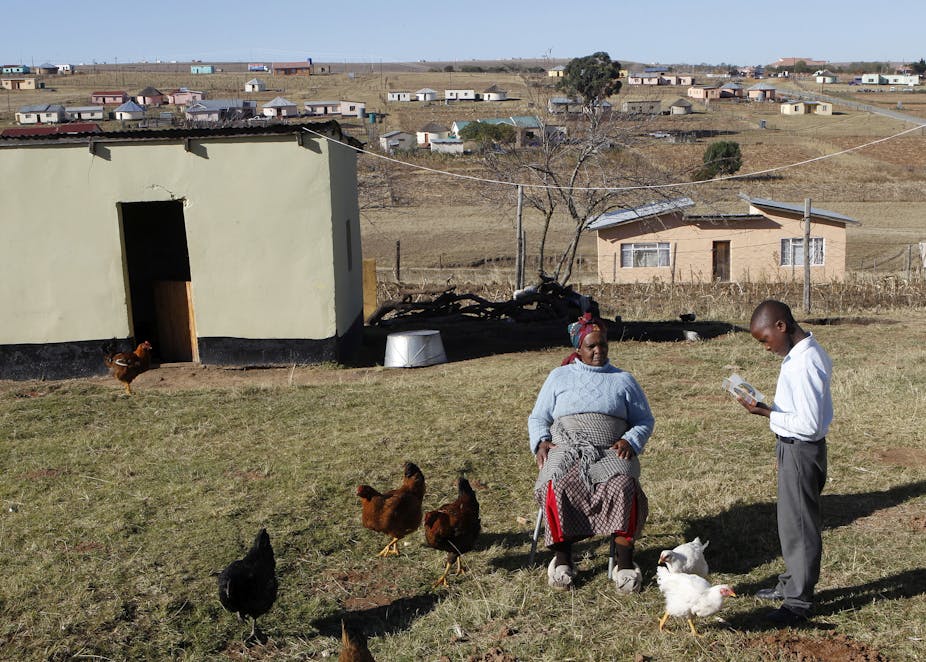Molofo and Bulewani are training as teachers at a university in one of South Africa’s largest cities, Cape Town. Both young men come from rural backgrounds and English is not their first language. Their experiences of moving from a rural area to a city, and of becoming English speakers, offer a fascinating insight into how language development and social transition are intertwined.
There are about 25,720 state schools in South Africa, and 11,252 are designated as rural. These rural schools tend to be poorly resourced – some don’t have proper furniture, let alone enough teachers or textbooks. Most pupils are taught in their mother tongues, not English, and even if they do learn in English they have little chance to practice speaking it at home or outside school. Pupils from schools in such areas tend not to perform as well in their final exams as their urban counterparts.
It was language that set Bulewani and Molofo apart from their classmates. I interviewed them, along with two other teaching students, as part of a research project presented at the 2015 South African Education Research Association Conference. An article based on this research has been submitted to the SA Journal of Education and is under review. The research findings echo results from elsewhere in the world: participants reported that “leaving behind” their home languages and their physical homes produced a sense of both loss and gain.
Social distance
It is important that this research used rural areas as a context. Such areas tend to be linguistically, educationally and economically isolated from the rest of a country. The students’ experiences are about more than just geographic distance between their rural homes and the city where they study – they’re about social distance, too.
US educationalist John H Schumann talks about this idea of social distance in his research, explaining it as the distance between two language groups in second-language acquisition. Social closeness involves being embedded in a culture. The more culturally comfortable one is, the less the social distance and the easier it is to learn the relevant new language.
Lives in transition
Molofo and Bulewani come from areas where they weren’t surrounded by English speakers. In some rural schools, even the teachers are not particularly proficient in English. Pupils are meant to be taught according to a policy of additive bilingualism – they learn in their mother tongues until Grade 4, and then switch to English as the language of teaching and learning.
This seldom happens, and neither Molofo nor Bulewani learned English this way. They had good English teachers who forced them to speak the language, and both found that they loved it. By the end of their school careers, the young men spoke English well enough to pass it and qualify for university entrance. They also spoke it well enough and had performed well enough at school to earn bursaries. Without this financial support, they would not have been able to take up their university places.
There were two transitory moments at play for Molofo and Bulewani. One involved a physical movement from a rural to an urban area. The other was a transition from functioning in their home or mother tongue to primarily speaking English. Both transitions were facilitated by their acceptance to university. The move came at a cost, though. One of the questions posed in the research was whether students felt that their culture had changed or was under threat because they had learned English. Both said they were losing tradition – but that this wasn’t necessarily a bad thing.
Molofo comes from the Eastern Cape province and grew up in an area governed by a chief. Such areas operate under traditional law. Constitutional democracy, with its notions of guaranteed rights, is remote. He had discovered a greater sense of equality and justice since moving to the city, explaining:
I am not that much interested in a traditional way because there is a lot that I discover that is not fair. Some of the things are not happening in the way they are supposed to. It depends maybe on who you are.
Loss
Bulewani celebrated the fact that he felt more in charge of his own destiny since his “transitions”. But he also experienced profound loss. His family – who are also from the Eastern Cape – lived off the land, and he missed this way of life. He remarked, for instance, that while at home he could go and pick something from the fields, whereas in the city he had to go out and spend money to buy food.
Mostly, though, his feelings of loss revolved around language:
I am losing a lot of words. I miss a lot of words … I am becoming more educated, but I am losing a lot of things in my culture. I am learning a lot of things from Western culture. Talking English. But I am losing a lot of things. I am losing some Xhosa language and traditions.
New voices
Universities need to start collecting more background information about their students to help them settle into this new environment and achieve their goals. For instance, institutions don’t know how many students are from rural areas and might be grappling with the sorts of changes Molofo and Bulewani articulated.
These young men’s voices open an important window on South Africa’s fast-changing society. They are at the forefront of this change, which is both positive and has obvious gains; but is also bittersweet and accompanied by a sense of loss.

